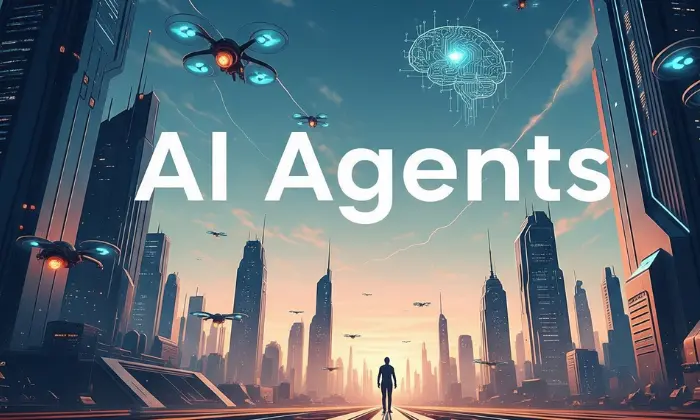AI is transforming industries, and one of its most powerful innovations is the AI agent. Whether it’s a chatbot that helps you on a website or a system that runs an entire customer service department, AI agents are behind the scenes making things smarter, faster, and more personal.
In this guide, we’ll explain what AI agents are, how they work, and how they are used in fields like digital marketing, automation, and beyond. This article is designed for beginners, so no technical background is required.
What Is an AI Agent?
An AI agent is a computer program that can perceive its environment, make decisions, and act to achieve a goal. These agents can think, learn, and improve over time using data and algorithms.
At its core, an AI agent behaves like a smart assistant. It observes, analyzes, decides, and takes action—sometimes in real time.
Key Features of AI Agents:
- Autonomous: Works without human intervention
- Goal-Driven: Designed to complete specific tasks
- Adaptive: Learns from experience or data
- Responsive: Reacts based on environment or input
Simple Example: AI Agent in Real Life
Imagine a robot vacuum cleaner. It:
- Senses the floor plan (perception)
- Determines the most efficient cleaning path (decision-making)
- Moves and avoids obstacles (action)
This is a basic AI agent in action.
Now apply the same logic to digital systems—chatbots, recommendation engines, and automation tools. They are all agents designed to achieve specific outcomes through intelligent behavior.
Types of AI Agents
There are several types of AI agents, categorized by complexity and ability:
1. Simple Reflex Agents
- Respond directly to input
- Example: A thermostat adjusting temperature based on the room
2. Model-Based Agents
- Store internal state to remember past actions
- Example: A navigation app learning traffic patterns
3. Goal-Based Agents
- Decide actions based on a desired goal
- Example: A chatbot that tries to solve customer problems efficiently
4. Utility-Based Agents
- Choose actions based on utility or best outcome
- Example: Stock trading bots maximizing return
5. Learning Agents
- Learn from experience to improve performance
- Example: AI writing tools like ChatGPT that improve with feedback
AI Agents in Digital Marketing
AI agents are now crucial tools in the world of digital marketing. Here’s how they are transforming the space:
1. Chatbots and Virtual Assistants
- Handle customer queries
- Available 24/7
- Personalized responses based on customer history
2. Recommendation Engines
- Used by eCommerce platforms (Amazon, Flipkart)
- Suggest products based on browsing behavior
3. Email Marketing Agents
- Send targeted emails automatically
- Adjust timing and content based on open rate and engagement
4. Ad Optimization Agents
- Manage and adjust ad campaigns
- Use data to improve click-through rate and ROI
5. Social Media AI Agents
- Analyze engagement
- Schedule posts and suggest hashtags
- Monitor brand mentions or trends
Benefits of Using AI Agents
- Efficiency: Automate repetitive tasks
- Scalability: Handle thousands of interactions at once
- Cost Saving: Reduce need for large human teams
- Speed: Make real-time decisions and actions
- Personalization: Offer tailored user experiences
Challenges and Limitations
While powerful, AI agents also come with challenges:
- Bias in Data: Poor training data can lead to unfair decisions
- Lack of Human Touch: Some tasks still need empathy and emotional intelligence
- Privacy Concerns: Agents using data must comply with privacy laws
- Complexity: Advanced agents require technical setup and monitoring
The Future of AI Agents
In the near future, AI agents will be more:
- Autonomous: Capable of handling end-to-end processes
- Conversational: Natural language interaction will improve
- Collaborative: Will work alongside humans, not just replace them
- Intelligent: Able to make complex decisions and explain them
Examples include:
- AI content creators
- Voice assistants like Siri evolving into personal managers
- Marketing AI agents creating personalized video ads on the fly
Tools and Platforms That Use AI Agents
- ChatGPT – conversational AI agent
- Google Bard – AI for productivity and search
- HubSpot CRM – uses AI for sales and customer tracking
- ManyChat – chatbot automation for Facebook and Instagram
- Midjourney, DALL·E – generative agents for image creation
Final Thoughts
AI agents are more than just tools—they are digital teammates. As AI becomes smarter and more accessible, understanding how these agents work is essential, especially for digital marketers, business owners, and creators.
From boosting engagement to automating operations, AI agents are shaping the future of communication and marketing.
Read other article about AI in Digital Marketing
